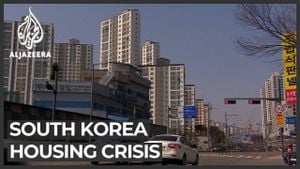New Zealand has announced significant new sanctions aimed at Russia and North Korea, as the country continues to express firm support for Ukraine amid the continued conflict with Russia. The latest sanctions package, confirmed by Foreign Minister Winston Peters, targets 52 individuals and entities linked to Russia and North Korea.
The newly imposed restrictions include 27 individuals and 25 organizations involved primarily in the military and energy sectors. According to statements from the New Zealand government, these individuals and firms have been identified as being complicit in activities associated with the Russian invasion of Ukraine, particularly actions surrounding the forced relocation and "re-education" of Ukrainian children.
Winston Peters emphasized the seriousness of these measures, noting, "...the list includes 27 individuals and 25 legal entities," which reflects New Zealand's commitment to hold responsible parties accountable for their roles in facilitating Russia's military actions. This move aligns with New Zealand's stance since the escalation of hostilities, as the country has already imposed sanctions on over 1800 Russian individuals and entities since March 2022.
The newly announced sanctions come exactly on the three-year anniversary of Russia’s full-scale invasion of Ukraine. Peters highlighted the importance of supporting Ukraine's recovery efforts, not just through sanctions but also financially. The New Zealand government has committed additional financial support totaling approximately $3 million NZD (around $1.7 million USD) to the Ukraine Relief, Recovery, Reconstruction and Reform Trust Fund (URTF) established by the World Bank.
This fund aims to assist the Ukrainian government with maintaining public services and planning for long-term rebuilding and reform initiatives following the damages inflicted by military conflicts. Peters mentioned, "The fund supports the government of Ukraine in maintaining services... and planning and implementing recovery, reconstruction, and reform," highlighting New Zealand’s dedication to aiding Ukraine beyond just imposing sanctions.
The international community is closely monitoring these developments. On one hand, New Zealand's government is asserting its position against Russian aggression, yet other nations, such as Hungary, have recently voiced opposition to imposing new sanctions on Russia, indicating divisions within international approaches to the situation.
New Zealand's actions mark another step in its proactive foreign policy measures, which have included extensive sanctions against both Russia and North Korea. This latest sanctions package addresses not only Russian entities linked to military capabilities but also expands its reach to North Korean military officials who are believed to be providing assistance to Russia.
These sanctions underline New Zealand's unwavering commitment to supporting Ukraine during challenging times, with officials emphasizing solidarity with allies and international partners. Despite varying global perspectives on the sanctions, New Zealand appears resolute. According to Peters, these sanctions will remain effective until there is significant change on the ground concerning Russia’s military actions.
New Zealand's introduction of sanctions showcases how small nations can still play pivotal roles in global foreign policy and international relations, particularly when aligned with larger efforts from nations such as the United States and those within the European Union.
Overall, this latest iteration of sanctions symbolizes New Zealand's stance on maintaining international order, condemning aggressive military action, and supporting humanitarian efforts. The government continues to stand by its principles, advocating for justice and accountability as the conflict persists.



